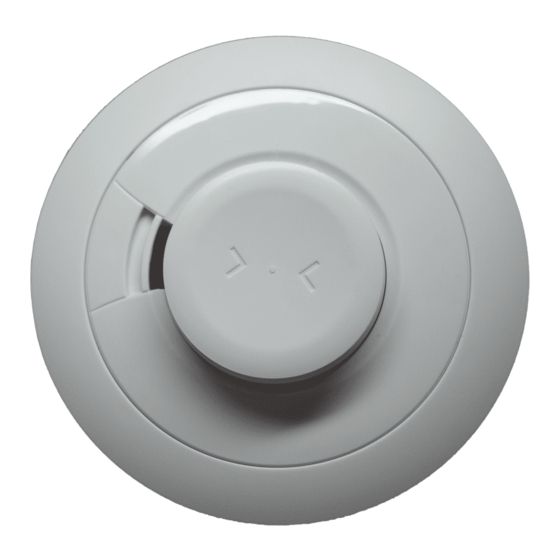Alula RE614 Schnellstart-Handbuch - Seite 5
Blättern Sie online oder laden Sie pdf Schnellstart-Handbuch für Rauchmelder Alula RE614 herunter. Alula RE614 12 Seiten. Smoke alarm connect+ compatible

Figure 3
SMOKE ALARMS
<610mm (24") FROM APEX
Wall Mounting
If ceiling mounting is impractical, Smoke
Alarms may be mounted on a wall,
provided that:
a) the top of the detection element is
between 150mm (6") and 305mm (12")
below the ceiling (see; Figure 3a).
b) the bottom of the detection element
is above the level of any door openings;
Wall mounting should only be
considered where close spaced beams
or similar obstructions may preclude
ceiling mounting. It is considered to be
the responsibility of the installer/client to
determine if the presence of asbestos in
the ceiling material would make ceiling
mounting 'impractical'.
Figure 3a
On a Sloping Ceiling
With a sloping or peaked ceiling install a
Smoke Alarm within 610mm (24") of the
peak (measured vertically). If this height
is less than 610mm (24") the ceiling is
regarded as being flat (see Figure 4).
Figure 4
SMOKE ALARMS
<610mm (24")
x
DEAD AIR
SPACE
PLACE IN CENTRAL
LOCATION AND
NOT WITHIN
305mm (12")
OF ANY CORNER
APEX
x
Locations to avoid
DON'T place Smoke Alarms in any of the
following areas:
• Bathrooms, kitchens, shower rooms,
garages or other rooms where the
Smoke Alarm may be triggered by
steam, condensation, normal smoke or
fumes. Keep at least 6 metres (20ft)
away from sources of normal smoke/
fumes.
• Locate away from very dusty or dirty areas
as dust build-up in the chamber can impair
performance. It can also block the insect
screen mesh and prevent smoke from
entering the smoke detector chamber.
• Do not locate in insect infested areas.
Small insects getting into the smoke
detector chamber can cause intermittent
alarms.
• Places where the normal temperature
can exceed 100°F (38.7°C) or be below
40°F (4.4°C) (e.g. attics, furnace rooms,
directly above ovens or kettles etc.) as
the steam could cause nuisance alarms.
• Near a decorative object, door, light
fitting, window moulding etc., that may
prevent smoke from entering the Alarm.
• Surfaces that are normally warmer or
colder than the rest of the room (e.g. attic
hatches). Temperature differences might
stop smoke from reaching the Alarm.
• Next to or directly above heaters or air
conditioning vents, windows, wall vents
etc. that can change the direction of
airflow.
• In very high or awkward areas (e.g. over
stairwells) where it may be difficult to
reach the Alarm (for testing, hushing or
battery replacement).
• Locate the Alarm at least 1m (39") from
dimmer controlled lights and wiring as
some dimmers can cause interference.
• Locate Alarm at least 1.5m (59") and
route wiring at least 1m away from
fluorescent light fittings as electrical
"noise" and/or flickering may affect
the unit.
3. Fire Safety Advice
When using household protective devices,
basic safety precautions should always be
followed, including those listed below
• Please read all instructions.
• Rehearse emergency escape plans so
everyone at home knows what to do in
case the alarm sounds.
• Use the Alarm Test Button to familiarize
your family with the Alarm sound and
5
